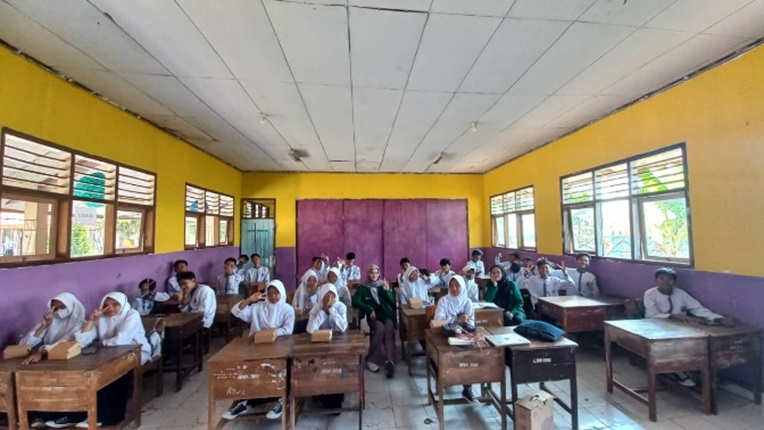Membangun Self Love pada Remaja melalui Psikoedukasi Building Self Love in Teenagers with Psychoeducation
Main Article Content
Abstract
Forming an image of oneself, roles, interests, values, beliefs, and physical changes begins when entering adolescence. This generally makes teenagers vulnerable to low self-esteem due to a lack of self-love. To anticipate this, an effort is needed to build understanding among teenagers regarding self-love so that they can recognize and respect themselves through psychoeducation activities. This psychoeducation activity is carried out using three stages, namely the planning, implementation, and evaluation stages. The planning stage is carried out by surveying the subject's condition and location of the activity site and coordinating with related parties. The implementation stage of psychoeducation activities involves delivering material and cultivating understanding related to self-love. The evaluation stage is done by looking at the pre-test and post-test results. The subjects of this psychoeducational activity were 28 students at SMPN 2 Lemahabang, Cirebon Regency, aged 13-15 years. The instrument was a questionnaire, and psychoeducation activities were implemented for one month. The results of psychoeducation activities show that there is an increase in the understanding of teenagers at SMPN 2 Lemahabang regarding self-love.
Downloads
Article Details

This work is licensed under a Creative Commons Attribution-ShareAlike 4.0 International License.
Authors who publish with this journal agree to the following terms:
- Any article on the copyright is retained by the author(s).
- Author grant the journal, right of first publication with the work simultaneously licensed under a Creative Commons Attribution License that allows others to share work with acknowledgment of the work authors and initial publications in this journal.
- Authors are able to enter into a separate, additional contractual arrangements for non-exclusive distribution of published articles of work (eg, post-institutional repository) or publish it in a book, with acknowledgment of its initial publication in this journal.
- Authors are permitted and encouraged to post their work online (e.g., in institutional repositories or on their websites) prior to and during the submission process, as can lead to productive exchanges, as well as earlier and greater citation of published work.
- The article and any associated published material is distributed under the Creative Commons Attribution-ShareAlike 4.0 International License
References
Adiningtiyas, S. W., & Ompusunggu, M. F. (2018). Hubungan antara Konsep Diri dengan Prestasi Belajar SIswa. KOPASTA: Jurnal Program Studi Bimbingan Konseling, 5(1). https://doi.org/10.33373/kop.v5i1.1448
Aisyah, A. Y., Agustina, N., Chairiyah, L., & Daliman, D. (2023). Self Love Training for Orphanage Youth. Proceedings of International Conference on Psychology, Mental Health, Religion, and Sprirituality, 1(1). https://doi.org/10.29080/pmhrs.v1i1.1164
Basaria, D., Indriana, L. M., Satyagraha, M. D., & Nia, N. (2022). Penerapan Self Love sebagai Bagian dari Pencegahan Remaja Menampilkan Perilaku Negatif di Lingkungan. Jurnal Bakti Masyarakat Indonesia, 5(1). https://doi.org/10.24912/jbmi.v5i1.18501
Bransen, J. (2015). Self-Knowledge and Self-Love. Ethical Theory and Moral Practice, 18(2). https://doi.org/10.1007/s10677-015-9578-4
Damayanti, A. A. M., & Susilawati, L. K. P. A. (2021). Peran Citra Tubuh dan Penerimaan Diri Terhadap Self Esteem Pada Remaja Putri Di Kota Denpasar. Jurnal Psikologi Udayana, 11(1).
Goodman, N., & Coopersmith, S. (1969). The Antecedents of Self-Esteem. American Sociological Review, 34(1). https://doi.org/10.2307/2092806
Hastan, V. F., & Sukendro, G. G. (2022). Kreativitas Influencer dalam Mengampanyekan Self Love untuk Kesehatan Mental di Instagram. Prologia, 6(1). https://doi.org/10.24912/pr.v6i1.10256
Henschke, E., & Sedlmeier, P. (2021). What Is Self-Love? Redefinition of a Controversial Construct. Humanistic Psychologist. https://doi.org/10.1037/hum0000266
Rahmawati, A. (2019). Analisis Kesulitan Siswa dalam Menyelesaikan Soal Cerita Matematika Berbasis Pembelajaran Pemecahan Masalah Kelas V SD Negeri Gebangsari 03. Jurnal Pengembangan Pembelajaran Matematika, 1(2). https://doi.org/10.14421/jppm.2019.12.104-109
Raras Rahcmatul Husna & Nurus Sa’adah. (2023). Self-Love dalam Perspektif Islami: Menjaga Kesehatan Mental dan Mengoptimalkan Potensi. Nuansa, 16. http://dx.doi.org/10.29300/nuansa.v16i1.4047
Resty, G. T. (2016). Pengaruh Penerimaan Diri terhadap Harga Diri Remaja di PAnti Asuhan Yatim Putri Aisyayah Yogyakarta. Jurnal Riset Mahasiswa Bimbingan dan Konseling, 5(1).
Sacco, R. G. (2013). Re-Envisaging the Eight Developmental Stages of Erik Erikson: The Fibonacci Life-Chart Method (FLCM). Journal of Educational and Developmental Psychology, 3(1). https://doi.org/10.5539/jedp.v3n1p140
Santrock, J. W. (2011). Life Span Development (Ke Dua Bel). Erlangga.
Septiana, N. Z., & Darina, J. (2021). Membangun Self Love pada Remaja Pengguna Instagram Ditinjau dari Perspektif Dramaturgi (Studi Fenomenologi Remaja Pengguna Instagram di Desa Ngebrak). Shine: Jurnal Bimbingan dan Konseling, 2(1). https://doi.org/10.36379/shine.v2i1.181
Septiawardani, H. & W. H. S. & R. L. (2023). Peningkatan Kepercayaan Diri Penerima Manfaat di PPSW Wanodyatama Melalui Psikoedukasi Self Love. Abdi Psikonomi. 4. https://doi.org/https://doi.org/10.23917/psikonomi.v4i2.2473
Sibaen, N. W., Buasen, J. A., & Alimondo, M. S. (2023). Principal components of students’ difficulties in mathematics in the purview of flexible learning. Journal on Mathematics Education, 14(2). https://doi.org/10.22342/jme.v14i2.pp353-374
